Gloomy morning light seeps through the floor-to-ceiling-length windows of the third-floor office of the Bradbury Building, located in Downtown Los Angeles. Walls strung with Chicano art and ceilings exposed by their interior pipes, Alfred Fraijo Jr.’s new law firm, The Somos Group, provides a homey and loft-like environment that allows for nothing but comfort.
Offering over the couch rather than the chair, Fraijo exudes put-togetherness, with healthy dashes of humility and curiosity as he sits and readies himself for questioning. There is a stark difference between the accomplished man today and the 18-year-old senior whose high grades and acceptance to an Ivy League were featured in a 1995 LA Times article.
Straight out of LA
An LA native and attorney, Fraijo, whose family founded the city of Irwindale, grew up in Boyle Heights in a Latino household with his parents and two older sisters.
“My father is a first-generation Mexican American born in LA. My mom is an immigrant from Sinaloa, she grew up in Tijuana,” Fraijo said. “So my grandmother on my mom’s side was a farmworker, and they would go to the fields and work seasonally in the U.S. But she grew up in Tijuana and met my father there. When they married and started a family, they moved to Boyle Heights.”

Fraijo Jr. launched his own firm, The Somos Group, an entirely BIPOC-led multidisciplinary group.
Consistently driven, Fraijo served as student body president with a 4.1 grade-point average while attending Theodore Roosevelt High School, along with being a member of a community revitalization project, LA Neighborhood Initiative, and sitting on the advisory council for the Eastside’s City Council district.
Fraijo has always had a passion for public service, looking up to Chicano council member, Richard Alatorre, as his inspiration and influence. This interest followed Fraijo as he traveled from East LA to Cambridge, Mass. through scholarships, loans and a job at the Reischauer Institute of Japanese Studies, to attend and graduate from Harvard University with a bachelor of arts in government in 1999.
“When I went to college, I was really interested in government,” Fraijo said. “And I figured that I should be an expert in how laws are written and how they’re enforced. So I thought I’d attend law school to be an attorney.”
Boyle Heights
Returning to his roots, Fraijo moved back to Boyle Heights and attended Loyola Law School, where he was introduced to a nonprofit, the Greenlining Institute, in San Francisco that focused on the redevelopment of contaminated land, which introduced him to a bridge built between policy, land use and economic opportunity for Latino communities.
“It had the community in participation, educating the community around these issues regarding environmental justice, land use, etc.,” Fraijo said. “And it also had, I think, what’s really important is kind of a tangible connection to improving neighborhoods, physically improving the built environment, and I think that’s really important.”
After earning his Juris Doctorate in 2002, it was a long journey getting to where he is now – a 30-year-old partner of Sheppard Mullin Richter & Hampton LLP’s Real Estate, Land Use and Environmental practice in the firm’s Los Angeles and San Francisco offices until this March. Fraijo, who became a lawyer in December 2002, has specialized in affordable housing, urban redevelopment and advancing social justice.
“The journey [of working in big law] was about being an advocate, being an advocate both for my clients and also being an advocate for our Latino community within the legal industry,” Fraijo said.
Latinos underrepresented in LA law
According to the State Bar of California, Latinos are particularly underrepresented, comprising 36 percent of the state’s population, but only 6 percent of all California licensed attorneys. And as a member of the American Bar Association, the State Bar of California, the State Bar of Washington, D.C., the San Francisco Bar Association, the Los Angeles Bar Association and the Mexican American Bar Association, fixing the lack of diversity has been a priority for Fraijo.
“If we don’t have lawyers that are culturally competent, that understand history around discrimination and disadvantage in disadvantaged communities, we’re not going to have effective counsel for many of these individuals,” Fraijo said. “For me, that was really important. The work that I’ve done in big law has been about, one, becoming an expert in my field, which is real estate and land use, and, two, ensuring that we have a greater number of BIPOC (Black, Indigenous and People of Color) attorneys working in big law.”
Furthering this goal of his, in March, Fraijo launched his own firm, The Somos Group, an entirely BIPOC-led multidisciplinary group committed to broadening “equity goals and advancing the value and expertise of people and communities that have been historically underserved and undervalued,” as stated on the firm’s website.
The Somos Group consists of two branches; law practice, which provides attorneys and law clerks for clients; and advocacy, with non-legal professionals serving real estate clientele on various initiatives. Supporting their clients, the majority of which are involved with the government in some capacity, navigate regimes such as the energy industry, infrastructure or housing, which is done through a completely BIPOC group of executives – an important goal of Fraijo’s.
“I feel like Somos is filling the gap in the industry,” Fraijo said. “I do think that our clients are very interested in working with organizations that are multidisciplinary because the challenges that they’re facing require solutions that really depend on multiple expertise. That is the work that I was doing at Sheppard, and launching my own business gives me greater latitude to be able to harness the expertise of different professionals.”
BIPOC partners
One of the BIPOC partners of the firm is Kira Teshima Conlon, one of the founding partners and owners of the Somos Group and principal of their planning division. Honolulu-born and a California resident since earning her bachelor of arts in International Studies-Economics from the University of California, San Diego, and Doctor of Law (J.D.) from Southwestern Law School, Teshima Conlon met Fraijo in 2011 as a summer law clerk at Sheppard Mullin. Becoming an associate in 2012 and a partner of the firm in 2021, the two attorneys developed a friendship that would lead them to develop the Somos Group.
“This evolution of something that we started building together at Sheppard, building a multidisciplinary team, a truly diverse team of professionals, both lawyers and non-lawyers, feels natural,” Teshima Conlon said. “Now, we’re on a platform where we can lean into that more. We have planners, we have design professionals, and we have folks who are experienced in labor and in public outreach and community organizing. I just feel like this is a natural progression of what we were trying to do at Sheppard, but now under the umbrella of civil security.”
In addition to his business, Fraijo is immensely active in the LA community, supporting nonprofits such as Mi Centro LGBT, an LA center providing services for the LGBTQ community, and expanding housing for members of the Boyle Heights community through his role as a team leader of Sheppard Mullin’s Latin America Practice Group.

The Somos Group consists of two branches; law practice, which provides attorneys and law clerks for clients; and advocacy, with non-legal professionals serving real estate clientele on various initiatives. Supporting their clients, the majority of which are involved with the government in some capacity, navigate regimes such as the energy industry, infrastructure or housing, which is done through a completely BIPOC group of executives.
“I was very concerned about issues of displacement and gentrification in Boyle Heights,” Fraijo said. “I thought it was important for us, for myself through the work that I do, to demonstrate how you can be a sustainable business and still do good for the community. It requires an adjustment in your business model, and it requires new types of creative partnerships.”
Importance of community
The land use attorney has been supportive of the community he grew up in and has remained an integral member of many nonprofits and organizations. He is a board member of California Harvesters, Inc., Mi Centro LGBT, the UCLA Latino Policy and Politics Initiative and the USC Lusk Center for Real Estate, and has founded organizations such as City Labs Boyle Heights, HONOR PAC, a Latino LGBTQ political action committee and Inclusive Action for the City.
Inclusive Action for the City (IAC), formerly known as Leadership for Urban Renewal Network, was founded by Fraijo and a handful of practitioners in 2008. With a mission to serve the underinvested communities in LA and build economies, the nonprofit has, in its 15 years, led the campaign to create a permit system for street vendors and has developed microfinance programs to aid small businesses in low-income neighborhoods.
“I think that’s how we make our city stronger, when people are not just thinking about themselves,” said Rudy Espinoza, Executive Director of IAC and the first appointed employee of the organization. “They’re thinking about how they are going to support the city in their community, beyond their day job, and beyond their self-interest. Alfred, to me, is a prototype of that. He’s involved in a lot of things, and I think that that’s what makes it special. We need more people like Alfred in our city.”
Carrying different identities as a queer Latino, Fraijo proudly represents two communities that he is bridging the gap between. And through the organizations he supports and has had a hand in creating, those that are driving forces behind health and social justice, he plans to help them continue uplifting the community they serve.
“That, for me, is continuing to address the issue of under-resourced, underserved communities,” Fraijo said. “And all of these organizations are breaking new ground in that way. And I feel I have been a part of the new lens that they have in terms of their focus. So I’m happy to do that. I’m really proud of being able to serve.”
Being an inspiration
For the Boyle Heights native, showing not only young Latinos but young, queer Latinos that regardless of the inevitable obstacles they might face, it is possible for them to grow as successful as they strive to be is important. But that’s not his only piece of advice for young professionals. Having a sense of pride in their history and knowing that their city, LA, was built by immigrants, black and brown settlers, is crucial.
“I think it’s really important and, frankly, our obligation to continue to be present when it comes to the decisions that are being made about how the city grows, how the city addresses issues around climate change, how it addresses issues of housing affordability,” Fraijo said. “And because I have my background as a lawyer, I feel like I have unique expertise that can lend itself to the kinds of solutions that we need to solve the challenges of today.”
A self-described Chicano, Fraijo holds a heavy admiration for Chicano art and the people behind the brush strokes and lines. And with a large collection that has accumulated over the years, his arsenal is very near and dear to his heart.
“I believe that in the art world, black and brown bodies are not valued as much as they should be. And part of the work that I’m doing is trying to lift the understanding in the art industry around the extraordinary brilliance of our Chicano and Latino artists in the U.S.,” Fraijo said. “Chicano art is American art, and it plays an important role in the canon of art history in the U.S. Chicano art and the Chicano political movement are fused and many of the artists who gave meaning to the Chicano movement and to civic representation were queer artists. Collecting and supporting queer artists that are still producing extraordinary work is really important to me.”
Fraijo looks out to his future with excitement and gratitude as he continues to grow his recently-born firm, the Somos Group. Looking forward to expanding their multidisciplinary platform by potentially branching out to other cities outside of LA and learning to adapt to challenges they might face, the attorney is not only excited for what’s next, but also hopes to inspire younger generations.
“If there’s a young person or a young professional that’s reading this [and] becomes inspired, I think it makes a note,” Fraijo said. “That’s what I would love to see, and it makes my work even more meaningful and more important.”

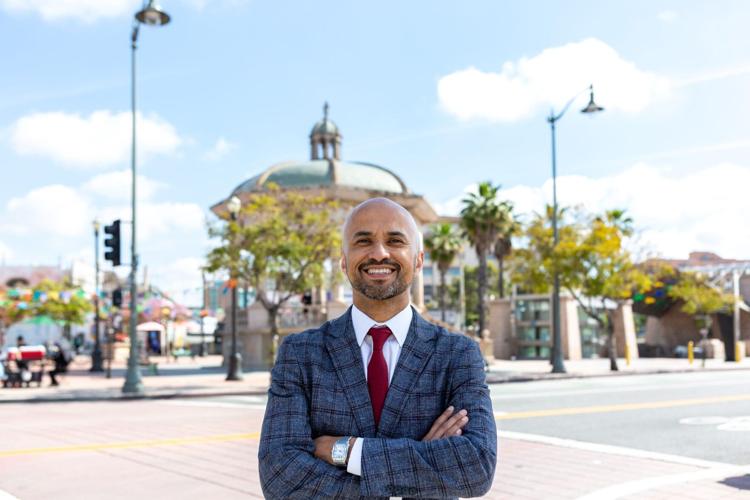
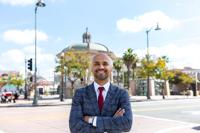
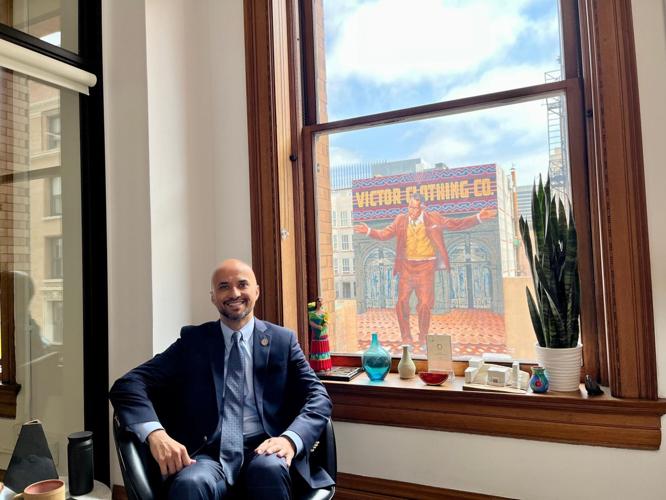
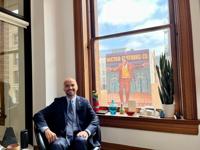
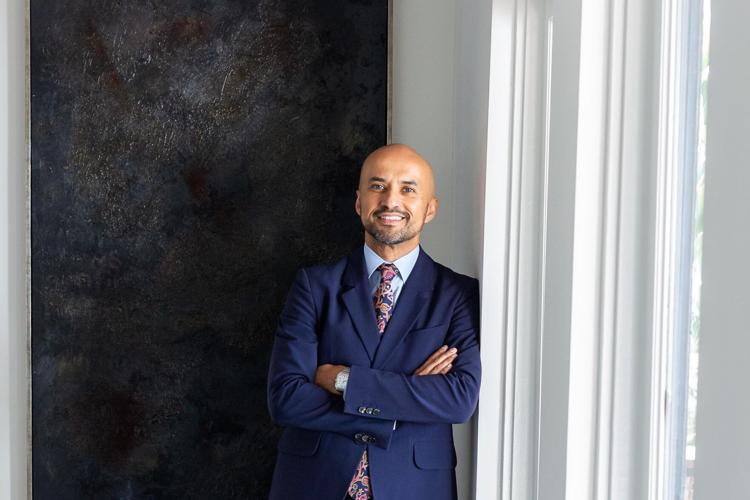
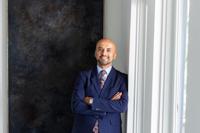
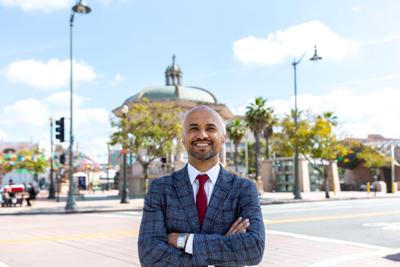

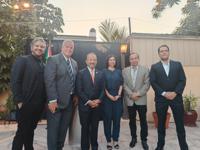

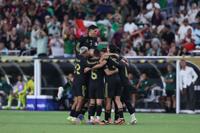



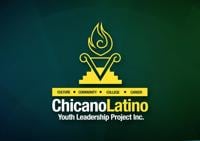
(0) comments
Welcome to the discussion.
Log In
Keep it Clean. Please avoid obscene, vulgar, lewd, racist or sexually-oriented language.
PLEASE TURN OFF YOUR CAPS LOCK.
Don't Threaten. Threats of harming another person will not be tolerated.
Be Truthful. Don't knowingly lie about anyone or anything.
Be Nice. No racism, sexism or any sort of -ism that is degrading to another person.
Be Proactive. Use the 'Report' link on each comment to let us know of abusive posts.
Share with Us. We'd love to hear eyewitness accounts, the history behind an article.